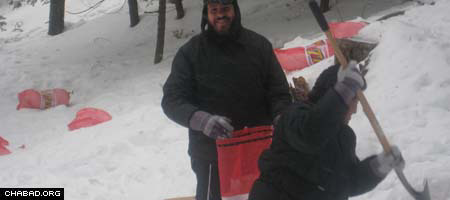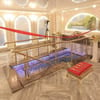No one ever said maintaining a mikvah was easy.
A team of rabbinical students and Southern California Jewish community members experienced that truth last week when they set out to harvest snow for two communal ritual baths maintained by Chabad-Lubavitch in Bakersfield and the Los Angeles suburb of Redondo Beach.
Essentially a pool of water that must be connected to another reservoir of water, a mikvah is a crucial facility in Judaism, necessary to the observance of the Torah's ritual purity laws.
Jewish law mandates that a mikvah's reservoir contain a minimum of 40 seah, or about 750 liters, of "water than comes from a natural source, such as rainwater," explained Rabbi Moshe Bogomilsky, a sought-after halachic decisor on the Executive Committee of Chabad-Lubavitch Rabbis in the United States and Canada. "But once water is in a receptacle, it loses its natural status. If you take rain water and place it in a cup, then it already becomes disqualified."
Transported snow also counts. But there is a catch: All the shovels and bags used in the process have to have holes, so that they could not be considered receptacles by Jewish law.
Since it hadn't rained in the area in quite some time, 20 people headed for the Greenhorn Mountains, which a recent storm had pounded with heavy snow, last Wednesday. Armed with shovels and 600 empty onion bags, they rode in a refrigerated truck with Rabbi Shmuli Schlanger, director of Chabad-Lubavitch of Bakersfield and its Mikvah Simcha Yisroel mikvah.
"I knew exactly where the snow was going to be," said Dr. Ori Raz, a Bakersfield community member, who drove the truck the 60 miles to the town of Alta Sierra near Lake Isabella.
"It's not every day that it snows in Southern California," commented Schlanger on the unusual journey.
Mikvah expert Rabbi Yirmy Katz and Rabbi Aharon Abend, spiritual leader of Chabad-Lubavitch of North Hollywood, escorted the crew to oversee the operation.
At their destination, the team first drilled holes into two of the shovels, after which the drills broke down. While Katz and Abend went down the mountain to look for some help with the other six, those left behind used the good shovels to break up the snow. They used their hands to fill the bags.
After filling 380 bags, Katz, who had just returned with the six newly-punctured shovels, directed them up the road to find "fluffier snow." By early afternoon, they concluded the eight hours of labor and headed back down the mountainside.
Then the truck broke down.
Navigating the Terrain

Later that night, the snowstorm worsened, closing whole swaths of roadways in Southern California, stranding dozens of cars on Interstate 5.
Robert Borenstein, a professional truck driver who attends Chabad-Lubavitch of Bakersfield, came out to help get the truck started at about 9:00 that night.
"There was a quite a lot of snow in a little truck, but thank G‑d, they finished what they wanted to do there," he said.
After depositing half of their cargo at Bakersfield, the next morning they headed out for the Jewish Community Center Chabad's mikvah, due to open Feb. 6 in Redondo Beach, some 125 miles away.
Right after the long-anticipated snow was emptied into the mikvah, "G‑d's sense of humor kicked in," noted Schlanger. It started raining.
Rabbi Yossi Mintz, director of Chabad-Lubavitch of the Beach Cities in Redondo Beach, added that "it hasn't stopped raining since we put the snow in."
The rain water would have filled up both mikvahs.
Said Schlanger: "I'm still tired, but it was worth it."








Join the Discussion